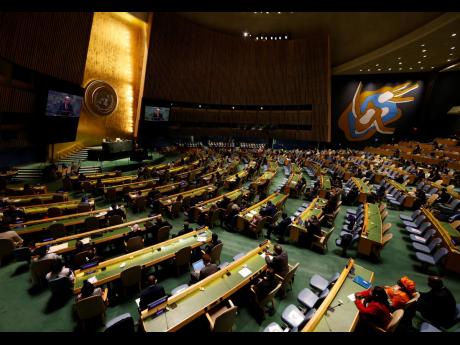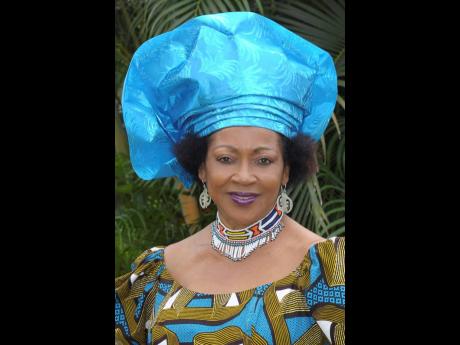Verene Shepherd | Fulfilling the promises of Durban 2001
In this edition of Reparation Conversations, we reproduce the speech by Prof Verene Shepherd, vice-chair of the United Nations Committee on the Elimination of Racial Discrimination (CERD), at the UN High Level Meeting to commemorate the 20th anniversary of the Durban Declaration and Programme of Action (DDPA), held at the UN Headquarters in New York on September 22.
Mr Chairman, heads and other representatives of states, members of civil society, distinguished guests all, I thank His Excellency Abdulla Shahid, president of the 76th Session of the General Assembly, for inviting me to speak at this High Level Meeting to commemorate the 20th anniversary of the landmark Durban Declaration and Programme of Action (DDPA), the outcome document of the World Conference on Racism held in Durban, South Africa, from August 31 to September 8, 2001. Based on the theme of this panel, I applaud all who were on the battlefield at Durban, especially members of civil society, academics and sympathetic states, who, against great opposition, ensured that reparatory justice for the transatlantic trade in enslaved Africans, chattel enslavement, colonialism and their legacies made its way into the outcome document, staring down the politics of should and efforts to deny justice and bring true equality to people of African descent and all other groups scarred by the evils of colonialism.
Despite the opposition and the boycotts of this meeting by several states, including countries targeted for reparation, we are here to reflect on a historic event that was designed to ensure that the atrocities of the past were not repeated; but also that those responsible for those atrocities would acknowledge responsibility and make amends. Yes, Mr Chair: in 2001, with the stench of apartheid having only recently been driven from the streets of Durban, South Africa, the international community gathered in a meeting not unlike this one, to develop a plan of action which, if implemented, would create a better world.
In the 20 years since the creation of the DDPA, and CERD, of which I am a vice-chair, has continuously declared its support, joined with other Treaty Bodies and UN Mechanisms, and, through its sessional review, held states parties accountable for implementing the recommendations of the Durban Declaration. But implementation requires wide knowledge and dissemination of the DDPA, its rationale, content and recommendations. One way is for the Human Rights Council to establish a well-resourced outreach programme for DDPA information and advocacy. Of course, we need to even strengthen the DDPA’s call, so that it is made crystal clear that the 15th to 19th century trade in Africans by various European states (who co-opted some Africans into their criminal enterprise) was illegal; that those whose ancestors took part in what was a crime against humanity must apologise and commit to reparation for historic wrongs and continuing harm, not simply acknowledge and express regret; that an injustice without a remedy is abhorrent to the spirit of justice.
PROFOUND MILESTONE
The Durban Declaration and Programme of Action remains a profound milestone in articulating the harms of colonialism and slavery, both historically and in the present, emphasising the structural forms of racism and racial discrimination that to this day require urgent attention. The UN High Commissioner for Human Rights has called for a transformative agenda to uproot systemic racism, including reparation for historic wrongs, an agenda imperative also laid down in the DDPA and the Programme of Activities for the International Decade for people of African descent.
The reality, though, is that twenty years on, not only is the battle over reparation as intense as it was in 2001, with very little change in the opposing sides, but, as the High Commissioner’s Report highlights, “no state has comprehensively accounted for the past or for the current impact of systemic racism”. Instead, there remains a pervasive failure to acknowledge the existence and impact of systemic racism and its linkages with enslavement and colonialism. The legacies of the past also affect other groups, including the descendants of indentured Asians, subject to deceptive indentureship in the 10th and 20th centuries in several countries around the world, including the Caribbean, Fiji and Mauritius.
I think it is time that we who are gathered here reject the arguments used to oppose reparation. For example, many have pushed the idea that distance gives us the detachment we need to form a dispassionate view of the past, all in the name of what modernists called “objectivity”, the antidote to blind prejudice. In the view of my region, the most affected by this crime against humanity, distance only affects how we think about the past. Despite the intervening years, CARICOM, with its blueprint for reparatory justice – the Ten Point Action Plan which has taken inspiration from the DDPA – has intensified its resolve that time between 1492 and now has simply given us more time to gather the evidence we need to push the demand in 2021.
The route to true racial justice and equality for people of African descent lies in reparation for the maangamizi (African Holocaust); a rejection of the argument that it was legal at the time; a refutation of the theory of distance that pushes the “too long ago in the past to have contemporary application” narrative, and the philosophy that holds one race superior and another inferior. Former colonisers must repair the dark legacies of racial discrimination against Africans, people of African descent and other groups affected by colonialism, before all peoples of the world can move forward in peace and reconciliation and build a better future.
If we wish to build a more equitable, just and peaceful world, complicit states must return to the scene of their crime and clean up their colonial mess, which is everywhere visible.”
Send feedback to reparation.research@uwimona.edu.jm


